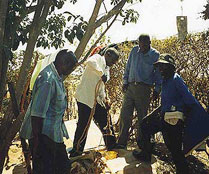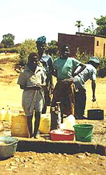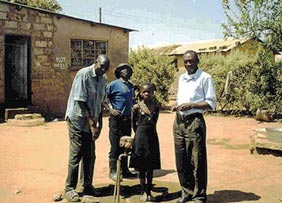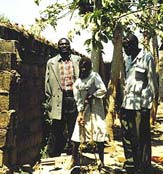
home
methodology
& outputs
© University of Newcastle upon Tyne
 Second order water scarcity in Southern Africa
Second order water scarcity in Southern Africa
The DFID Engineering KaR Programme: Proposal W1-17, 2002-2007
A Specimen Interview
Interview Date: Tuesday 19th August 2003, conducted with a community worker in Matero Township in Lusaka by researcher Paxina Chileshe.

What is the population of Matero?
There are approximately 75,000 people living in Matero. It is still a growing community with new plots being allocated in different parts. Unfortunately the plots are allocated by politicians and not by the City Council that are responsible for the city planning.
How long have you worked in this area?
I have been working in different communities around Lusaka for the last 10 years. I enjoy working with communities especially with youth projects.
Which part of Lusaka do you live in?

I live in Chipata settlement.
So you are a member of the water scheme there?
Yes I am a member of the water scheme. I pay K3000 every month to get 7 x 20 litres of water every day. My family actually uses the entire water ration for the day some how.
What was your source of water before the water project in Chipata?
I used to get water from the local school near my house. Some times the water was free as the school has a bore hole and sometimes we were asked to pay K100 for 20 litres. I think this was just for the maintenance of the borehole.
Do you treat water at household level before drinking?
Yes we add chlorine to the water from the tap before drinking it. I work with different communities so I try to live out what I preach to other members of the community.

What do you think about the operations of the water scheme in Chipata?
I think by now individual connections that people were promised at the beginning of the scheme should have been rolled out. So I would conclude that it is not progressing very well at the moment.
What do you think of the practice of having the CBEs and the running of a water schemes?
Personally I think water systems and schemes should be run by Local Authorities. If the Local Government owns the infrastructure then it should also maintain it. I think they would be fewer problems this way. For example since LWSC started operations the water situation in Matero has gotten worse. Now most households only get water twice a week.
Are you aware that most residents in Matero do not pay for their water?
I think that is to be expected as people are not seeing a good standard of services from LWSC. When LWSC was about to take over the LCC operations they came and held a meeting here in Matero and asked the community members how much they were willing to pay for water. A figure was proposed but this can only be paid if people actually get water everyday which they don’t.

Apart from the lack of a good standard of service provision, is there anything else that results in none payment of water fees? For example I hear even electricity bills are rarely paid in Matero.
Well people in Matero are just tired of getting a raw deal. Each time politicians promise some changes during election time but there is no action after they are voted into power. The water and sanitation problems have been around for a long time. There is also a lack of social welfare to help pensioners in this country. Gone are the days when people used to retire and go to the village. We need to rethink our strategy regarding social welfare. Some pensioners, just like the unemployed, do not have the resources to pay their water and electricity bills.
Emerging Questions
- What are the levels of co-ordination and collaboration between city planners and service providers?
- What are the power relations between local politicians and city planners especially in plot allocation?
- What are the expectations of the communities from water service providers and vice versa?
- Has a distinction been made between the ability to pay for water and the willingness to pay for water?
- Who owns and maintains the water supply infrastructure?
- If water supply is not consistent then what are the water sources used by Matero residents when the taps are dry?